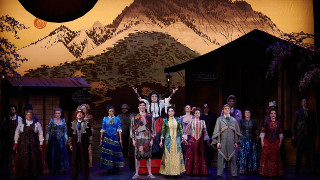
Paulanne Simmons
The Mikado
More than 130 years after its opening at the Savoy Theatre, William Gilbert and Arthur Sullivan’s comic opera “The Mikado” remains the most frequently performed of its genre. The Victorian duo (Gilbert wrote the book and lyrics, Sullivan the music) set the opera in Japan, a country that had been forcibly opened to Western trade only a few years previously and remained extremely exotic. But the characters are singularly British, as is Gilbert’s satire. It’s always a pleasure to see a revival of “The Mikado.” But it’s a singular pleasure to see a revival by the New York Gilbert and Sullivan Players, who seem to have an instinctive knowledge of how to get the Victorian masterpieces right and relevant in the 21st century. This production is impeccably directed by David Auxier, who has remained faithful to the original, save a few updates. Auxier has written a prologue that traces the origins of the opera back to an office of the Savoy Theatre, where the impresario D'Oyly Carte (Matthew Wages) is urging Gilbert (Auxier) and Sullivan (David Macaluso) to come up with a new opera, while various performers in their current opera, “Princes Ida,” come in with their complaints and comments. The prologue makes great use of two well-known stories related to “The Mikado”: Gilbert wanted the story to involve a magic lozenge. He came up with the Japanese setting when a Japanese ceremonial sword fell on his head. What’s more, the prologue lets the audience know this opera has nothing to do with Japan. Auxier has also washed away many of the distinctive Japanese elements that seemed so charming in Victorian England and seem so racist in early 21st century America: no more submissive womenfolk with choreographed fan dances. No more makeup to make Europeans look Asian. And the lyrics of a few songs have been updates with comments on current events close to the heart of liberal theatergoers, particularly when the Lord High Executioner reads his list of “people who would not be missed.” But the essential is still very much present. “The Mikado” is set in the town of Titipu, where Nanki-Poo (the soulful John Charles McLaughlin), a wandering minstrel (secretly the son of the Mikado) has returned in search of the delicious Yum-Yum (a coy Sarah Caldwell Smith), a young lady he has fallen in love with. Unfortunately, Yum-Yum is the ward of Ko-Ko (Macaluso in a fabulous turn), an ex-tailor, now the newly appointed Lord High Executioner, who has decided he wants to marry her. When the Mikado (David Wannen) issues a decree that it’s about time someone was beheaded, The Lord High Executioner confers with Poo-Bah ((Wages), a nobleman who has secured the office of all the regularly appointed bureaucrats, and they decide the victim will most conveniently be Nanki-Poo. Another complication arises when it appears Nanki-Poo has already been claimed by and is trying to escape from Katisha (Caitlin Burke), who’s not exactly the most attractive lady of the court. The various surprising twists and turns that follow lead to the unsurprising ending in which love triumphs. They also give Gilbert ample opportunity to lampoon despotic rulers, incompetent bureaucrats, the snobbish aristocracy and foolish lovers; and Gilbert and Sullivan the chance to write some of their best-loved songs: “A Wand’ring Minstrel I,” “Behold the Lord High Executioner,” “Three Little Maids from School Are We,” “The Flowers that Bloom in the Spring,” “Willow, Tit-Willow.” Scenic designer Anshuman Bhatia has bedecked the stage with cherry blossoms, rising suns and, when necessary, the mighty appendages of nobility. Costume designer Qunito Ott has collected an assortment of breathtakingly beautiful Victorian dresses for her Japanese women, taking away the onus of racism and reminding us of exactly who is at the center of this satire. In an era of political correctness, “The Mikado” can be a political nightmare. But the New York Gilbert and Sullivan Players, with its great expertise, has leaped above and beyond the pitfalls to turn this “Mikado” into an artistic triumph.
|
| recordings | coupons | publications | classified |

